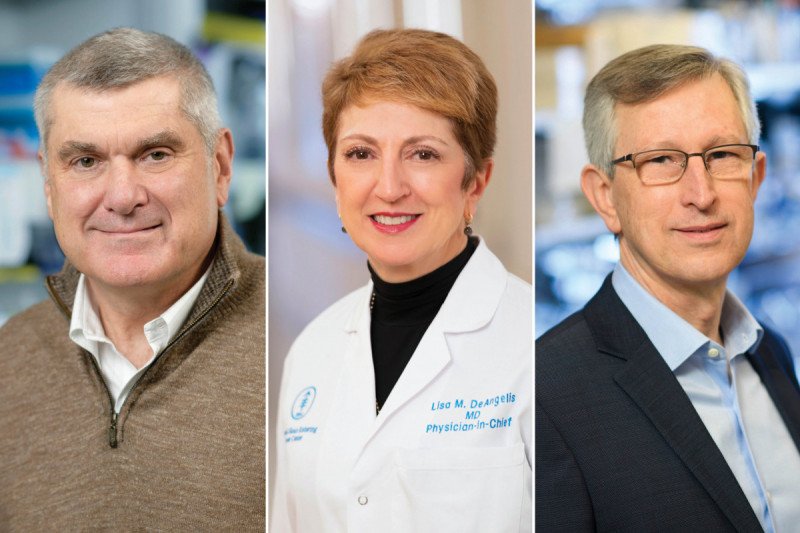
From left: Craig B. Thompson, President and Chief Executive Officer; Lisa DeAngelis, Physician-in-Chief and Chief Medical Officer; and Joan Massagué, Director of the Sloan Kettering Institute.
Dear MSK Community,
These are the four most frightening words for a patient to hear: “Your cancer is back.”
As we mark the 50th year of the War on Cancer and look to the future, our mission at Memorial Sloan Kettering is nothing less than conquering the most urgent challenge: preventing cancer’s spread. Also called metastasis, it causes 90 percent of cancer deaths. It’s why we are devoting this entire issue to reporting on how we offer hope and help to patients whose cancer has spread. In the clinic, we are developing more targeted drugs, more precise radiation, and more sophisticated surgical techniques to treat our patients. In the lab, we are learning more every day about why cancer cells metastasize and how to stop them.
Our vision to save more lives requires a commitment to hire and train the brightest minds and a significant investment in four key areas of technology, which are already bringing about astonishing advances:
- Better models to study cancer: Conducting research in mice is time-consuming and doesn’t necessarily reflect cancer biology in humans. New technology makes it possible to grow samples of a patient’s own tumor in a dish in order to understand its evolution and test its response to a cancer drug — getting results faster than ever before.
- Visualizing cancer at every level from atoms to organs: State-of-the-art imaging equipment can be used to visualize single cells moving and reacting in real time; observe how cancer cells behave and find them before they take root in new places; inspect fragile tissue samples; and spot tumors in the body.
- Analyzing cells one at a time: We’ve made great progress understanding how genetic mutations can drive cancers. But they don’t account for all tumor behaviors, particularly metastasis. Sophisticated equipment helps us understand how cancer cells adapt to new environments as they break free from their original tumors.
- Using computers to decode cancer’s behavior: Through all of our new technologies, we are gathering more data than ever before. We need to improve our computational methods to organize, describe, and find patterns in this data that can unlock the reasons cancer spreads.
Our patients choose MSK because our compassionate care is powered by innovative research that we conduct through a major investment of resources. Our scientists and physicians have helped develop and test groundbreaking chemotherapy drugs, immunotherapies, surgical and radiation techniques, and countless other treatments that have saved lives. And we share our work with the world.
We know that with enough resources, we will stay on a path of relentless discovery, leading the way and protecting our patients from hearing those four frightening words.
CRAIG B. THOMPSON
President and Chief Executive Officer
LISA DEANGELIS
Physician-in-Chief and Chief Medical Officer
JOAN MASSAGUÉ
Director, Sloan Kettering Institute

